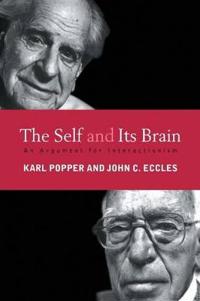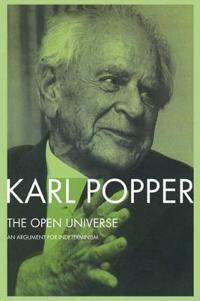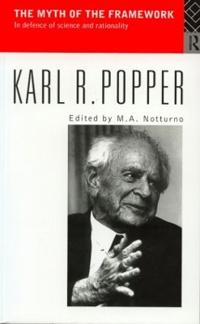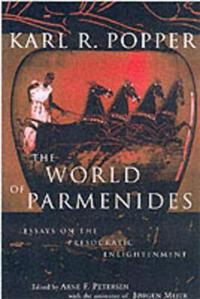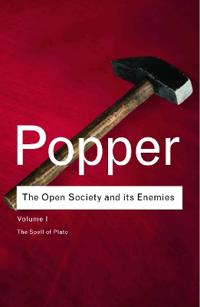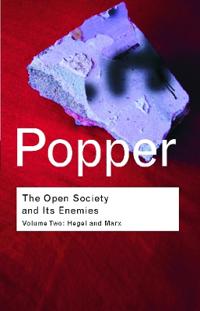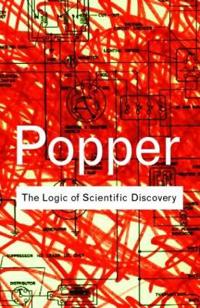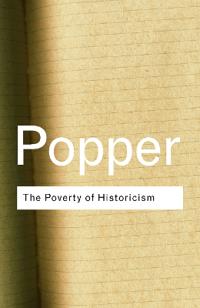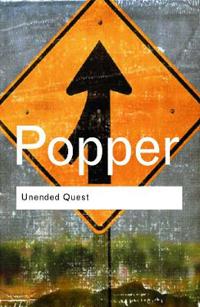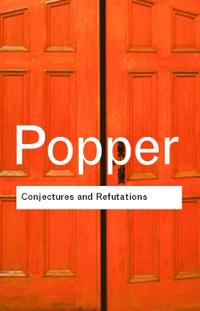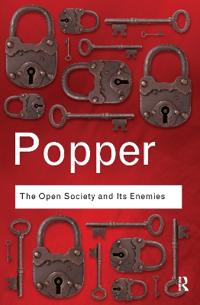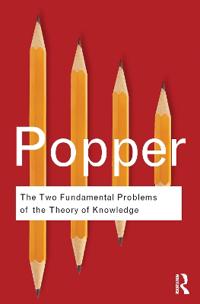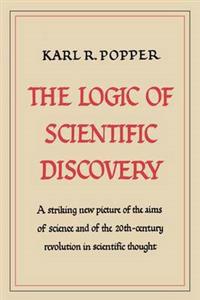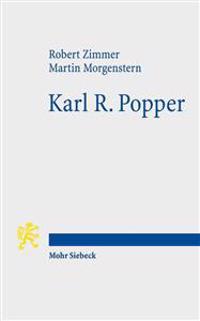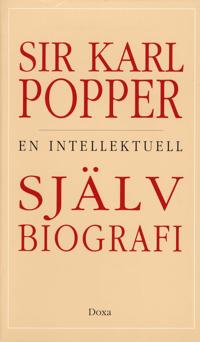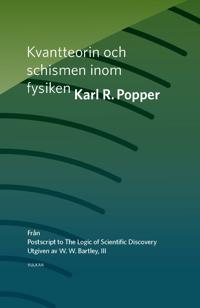The Self and Its Brain (Häftad)
avSir Karl R. Popper, Sir John C. Eccles
ISBN: 9780415058988 - UTGIVEN: 198402The relation between body and mind is one of the oldest riddles that has puzzled mankind. That material and mental events may interact is accepted even by the law: our mental capacity to concentrate on the task can be seriously reduced by drugs. Physical and chemical processes may act upon the mind;[...]
The Open Universe (Häftad)
avSir Karl R. Popper
ISBN: 9780415078658 - UTGIVEN: 198812The Open Universe is one of the three volumes of Karl Popper's Postscript to the Logic of scientific Discovery. The Postscript is the culmination of Popper's work in the philosophy of physics and a new famous attack on subjectivist approaches to philosophy of science.[...]
The Myth of the Framework (Häftad)
avSir Karl R. Popper
ISBN: 9780415135559 - UTGIVEN: 199512In a career spanning sixty years, Sir Karl Popper has made some of the most important contributions to the twentieth century discussion of science and rationality. The Myth of the Framework is a new collection of some of Popper's most important material on this subject. Sir Karl discusses such issue[...]
The World of Parmenides (Häftad)
avKarl R. Popper
ISBN: 9780415237307 - UTGIVEN: 200102This text comprises several essays on ancient Greek philosophy, inspired, as Sir Karl Popper himself states in his preface, by two desires - first, to illustrate the thesis that all history is the history of problem situations and that in following this principle we may further our understanding of [...]
The Open Society and Its Enemies (Häftad)
avSir Karl R. Popper
ISBN: 9780415237314 - UTGIVEN: 200207Written in political exile in New Zealand during the World War II and first published in two volumes in 1945, Karl Popper's "The Open Society and Its Enemies" is considered by some to be one of the most important books of the 20th century. Volume 1.[...]
All Life Is Problem Solving (Pocket)
avSir Karl R. Popper
ISBN: 9780415249928 - UTGIVEN: 2001-01-18A selection of Popper's writings on his main preoccupations towards the end of his life. Illuminates his process of working on his theory of science, and indicates his view of the state of the world at the end of the Cold War.[...]
The Open Society and Its Enemies (Storpocket)
avSir Karl R. Popper
ISBN: 9780415278423 - UTGIVEN: 200207Written in political exile during the Second World War and first published in 1945, Karl Popper's The Open Society and Its Enemies is one of the most influential books of the twentieth century. Hailed by Bertrand Russell as a 'vigorous and profound defence of democracy', its now legendary attack on [...]
The Logic of Scientific Discovery (Häftad)
avSir Karl R. Popper
ISBN: 9780415278447 - UTGIVEN: 200202Described by the philosopher A.J. Ayer as a work of 'great originality and power', this book revolutionized contemporary thinking on science and knowledge. Ideas such as the now legendary doctrine of 'falsificationism' electrified the scientific community, influencing even working scientists, as wel[...]
The Poverty of Historicism (Häftad)
avSir Karl R. Popper
ISBN: 9780415278461 - UTGIVEN: 200202On its publication in 1957, The Poverty of Historicism was hailed by Arthur Koestler as 'probably the only book published this year which will outlive the century.' A devastating criticism of fixed and predictable laws in history, Popper dedicated the book to all those 'who fell victim to the fascis[...]
Unended Quest (Häftad)
avSir Karl R. Popper
ISBN: 9780415285902 - UTGIVEN: 200205At the age of eight, Karl Popper was puzzling over the idea of infinity and by fifteen was beginning to take a keen interest in his father's well-stocked library of books. Unended Quest recounts these moments and many others in the life of one of the most influential thinkers of the twentieth centur[...]
Conjectures and Refutations (Häftad)
avSir Karl R. Popper
ISBN: 9780415285940 - UTGIVEN: 200205Conjectures and Refutations is one of Karl Popper's most wide-ranging and popular works, notable not only for its acute insight into the way scientific knowledge grows, but also for applying those insights to politics and to history. It provides one of the clearest and most accessible statements of [...]
The Open Society and Its Enemies (Storpocket)
avSir Karl R. Popper
ISBN: 9780415610216 - UTGIVEN: 201104'If in this book harsh words are spoken about some of the greatest among the intellectual leaders of mankind, my motive is not, I hope, to belittle them. It springs rather from my conviction that, if our civilization is to survive, we must break with the habit of deference to great men.' - Karl Popp[...]
The Two Fundamental Problems of the Theory of Knowledge (Häftad)
avSir Karl R. Popper
ISBN: 9780415610223 - UTGIVEN: 201108In a letter of 1932, Karl Popper described Die beiden Grundprobleme der Erkenntnistheorie - The Two Fundamental Problems of the Theory of Knowledge - as '...a child of crises, above all of ...the crisis of physics.' Finally available in English, it is a major contribution to the philosophy of scienc[...]
After The Open Society (Pocket)
avSir Karl R. Popper
ISBN: 9780415610230 - UTGIVEN: 2011-08-26In this long-awaited volume, Jeremy Shearmur and Piers Norris Turner bring to light Popper's most important unpublished and uncollected writings from the time of The Open Society until his death in 1994.
After The Open Society: Selected Social and Political Writings reveals the development of Pop[...]Karl R. Popper: Eine Einfuhrung in Leben Und Werk (häftad)
ISBN: 9783161535765 - UTGIVEN: 2015-04This biography of the founder of critical rationalism gives an insight into a complex and fascinating personality and into the making of one of the 20th century's most influential philosophical theories. As a modern representative of Enlightenment, Popper emphasized the role of criticism both in the[...]
Kritisk rationalisme (Häftad)
avKarl R. Popper
ISBN: 9788717066441 - UTGIVEN: 1996Indeholder et repræsentativt udvalg af Poppers artikler indenfor erkendelsesteori, videnskabsteori og politisk filosofi.[...]
En intellektuell självbiografi (Häftad)
avKarl R Popper
ISBN: 9789157802439 - UTGIVEN: 198801Poppers personliga skildring av sin filosofiska och vetenskapliga utveckling. Vi får följa hans liv från Wienkretsen till professuren vid London School of Economics.
Biografin publicerades första gången i serien Library of Living Philosophers. I denna serie har 1900-talets mest känd[...]Karl R. Popper, Kvantteorin och schismen inom fysiken (häftad)
ISBN: 9789188751201 - UTGIVEN: 2018-02I Kvantteorin och schismen inom fysiken utmanar Karl Popper (1902?1994) och en av vår tids mest framstående tänkare, en rad etablerade föreställningar om kvantteorin och i synnerhet den så kallade Köpenhamnstolkningen av kvantmekaniken.Han visar hur man kan förstå kvantteorins gåtfulla res[...]

